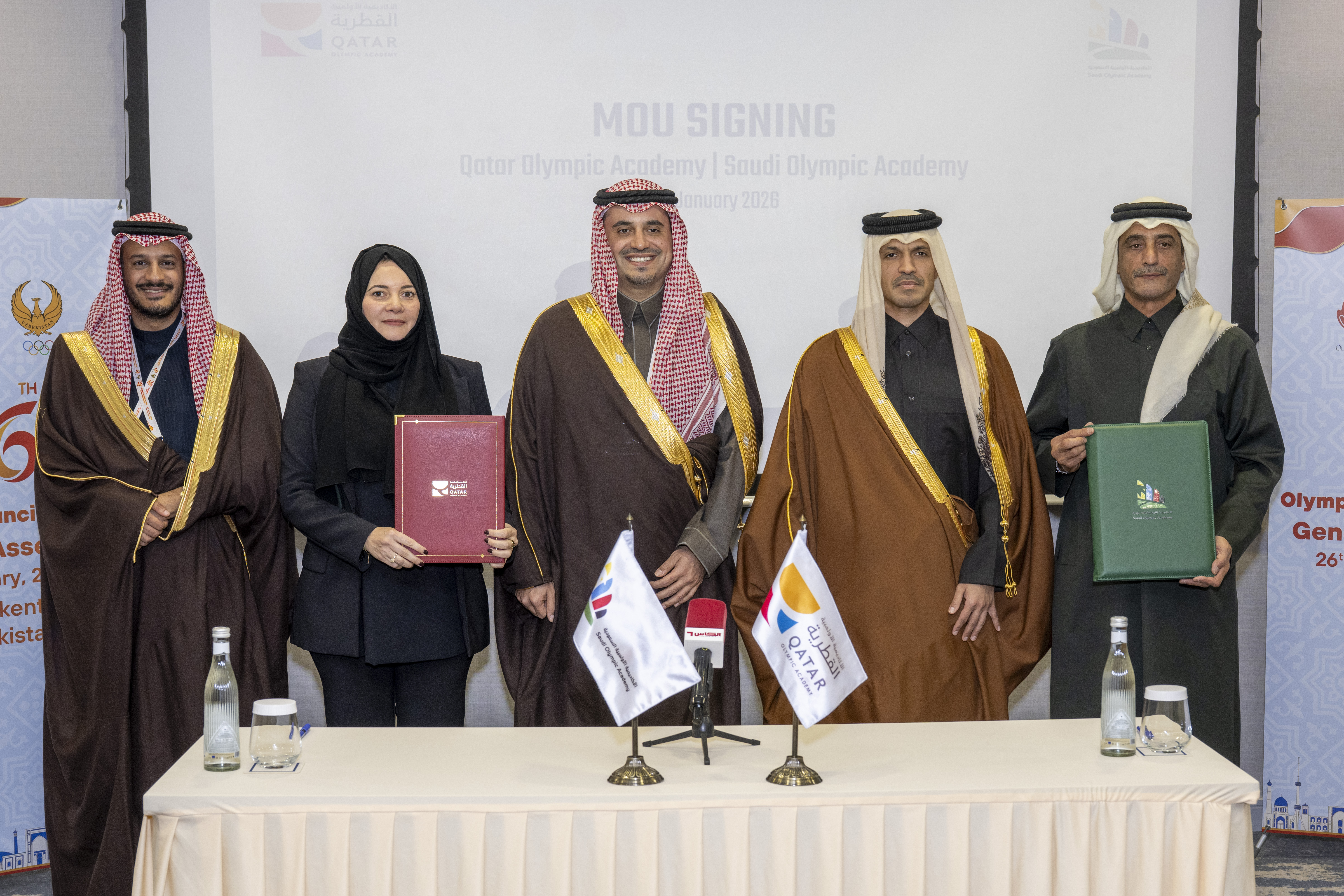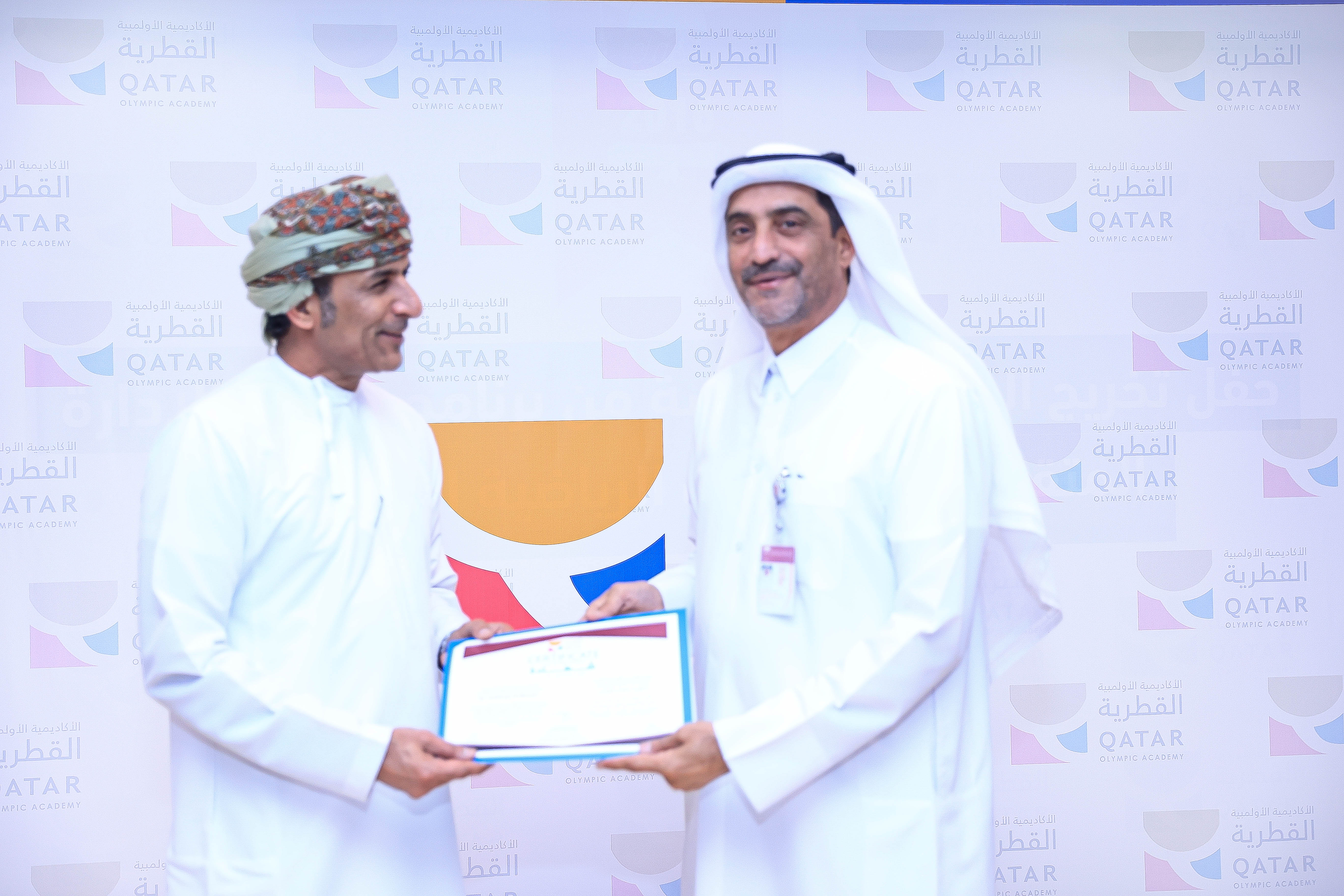Doha:
As part of a series of annual courses to educate the community about sports and Olympic culture, the Qatar Olympic Academy concluded last Thursday the course on the principles of the Olympic movement within the sports system, which it organized in cooperation with the Olympic Solidarity in the International Olympic Committee, as it is the first qualifying course for the diploma program in the management of sports and Olympic institutions held by the Academy for the thirteenth year, which witnesses a large turnout of students interested in administrative work in the sports field, both from inside and outside the State of Qatar where many sports leaders in the GCC have graduated from this course.
The course lasted for five days during the period from the twenty-ninth of last January until the second of February, with the participation of a number of students belonging to many different sports and administrative disciplines from inside and outside the State of Qatar.
The course was presented by Dr. Sulaiman Al Balushi, former Executive Director of the Oman Olympic Committee, who held many positions in the field of administrative work in Omani sports, and who presented many courses in this field.
On the first day, Dr. Al Balushi spoke about the concepts of sports management, which is defined as the art of coordinating the elements of work and the sports product in sports bodies and directing it in organized pictures in order to achieve these bodies and direct all efforts within the sports body to achieve its goals, as the goals are also required to be determined in sports management, but there are other important elements that represent the pillars of any successful sports administrative work.
He also spoke on the second day about the establishment of the Olympic movement and the modern Olympic Games (Olympic history), where the organization of the ancient Olympic Games began in the city of Olympia, Greece in the eighth century BC until the fifth century AD and then the organization of the modern Summer Olympic Games, which are in their current form in 1896, began at the initiative of the Frenchman Pierre de Coubertin, President of the International Olympic Committee and founder of the modern Olympic movement, where 241 players from 14 countries competed in that session. Nine games and 43 competitions.
The Games were interrupted during the First World War and the Second World War and then developed during the twentieth century in the form of the Winter Olympics for ice and snow, the Paralympic Games and the Youth Athletes' Olympic Games. Global socio-economic changes and technology have affected the course of the Olympic Games, which were reserved for amateur athletes and become open to professionals, leading to growing media interest and expanding their marketing through increased sponsorship by large corporations.
On the third day, he talked about the Charter and Olympic values, which is the constitution of the work of the Olympic Movement and the organization of the Olympic Games, and it is the whole of the provisions and laws approved by the International Olympic Committee, and in the event of a dispute or disagreement over the interpretation or application of these decisions, they are decided by the Executive Office of the International Olympic Committee.
In some cases, they are adjudicated by arbitration before the CAS Arbitration Committee, which was established in 1993 the court consists of twenty judges and is considered a supreme body independent of the International Olympic Committee.
On the fourth day, the lecture focused on administrative skills and steps to develop administrative and sports cadres, which reflect positively on the achievements of sports federations, whether at the level of professional sports or on community sports and spreading sports among the community.
On the last day, the lecture was talking about planning and resource management in sports institutions, and a test was conducted for students about what was studied in the five days.
It is worth noting that this course is considered the first part of the qualification for the Sports Management Diploma Program, and the Academy will re-launch this course in the first part of next September, while the Academy will offer the second qualifying course, which is called the Modern Management Course for Olympic Sports Institutions, in mid-October, which talks about a number of related axes, foremost of which are administrative skills in the sports field such as the benefits of good communication and effective communication, as well as work environment management, and time management. In sports institutions, the importance of time management in addition to other topics, most notably technical management, activities and events management, as well as human resources management.
More news

Qatar Olympic Academy Celebrates Graduation of Postgraduate Program Participants
Doha – February 17, 2026: Under the patronage of His Excellency Sheikh Joaan bin Hamad Al Thani, President of the Qatar Olympic Committee and Chairman of the Qatar Olympic Academy, the Academy celebrated this morning the graduation of students from its postgraduate programs at the headquarters of the Qatar Olympic Committee.

Qatar Olympic Academy Concludes Course on “Physical Activity and Autism”
Doha – February 2026: The Qatar Olympic Academy has concluded its five-day course on “Physical Activity and Autism”, held from February 1 to 5 at the Academy’s headquarters. The program witnessed wide participation of more than forty male and female trainees from inside and outside Qatar, representing diverse professional and academic fields related to physical education, sports training, special education, and the humanities, in addition to a number of parents of children with Autism Spectrum Disorder (ASD).

Qatari Olympic Academy Signs Memorandum of Understanding with Saudi Olympic Academy
Tashkent - Uzbekistan – January 26, 2026: The 46th Asian Olympic Council meeting in Tashkent, Uzbekistan, witnessed the signing of an important memorandum of understanding between the Qatari Olympic Academy and the Saudi Olympic Academy, in a step that enhances regional and Gulf sports cooperation. The agreement, signed by the Qatari Olympic Academy with the Saudi Olympic Academy, aims to strengthen cooperation in the field of developing sports training cadres.

